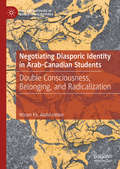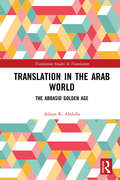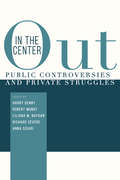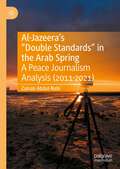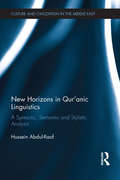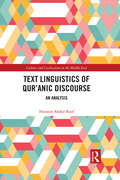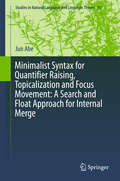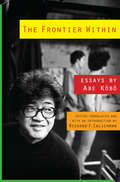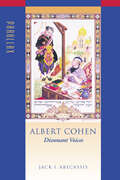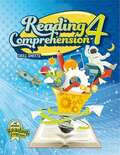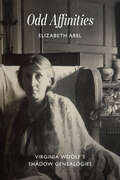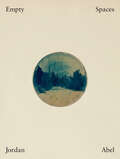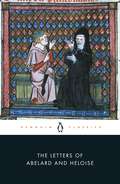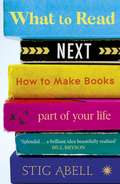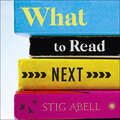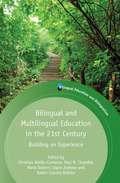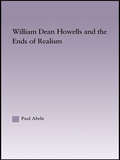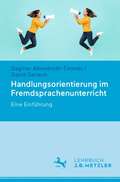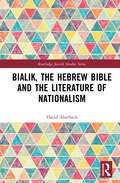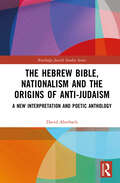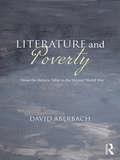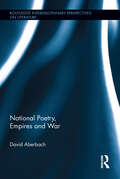- Table View
- List View
Negotiating Diasporic Identity in Arab-Canadian Students: Double Consciousness, Belonging, and Radicalization (Palgrave Studies in Educational Futures)
by Wisam Kh. Abdul-JabbarThis book, framed through the notion of double consciousness, brings postcolonial constructs to sociopolitical and pedagogical studies of youth that have yet to find serious traction in education. Significantly, this book contributes to a growing interest among educational and curriculum scholars in engaging the pedagogical role of literature in the theorization of an inclusive curriculum. Therefore, this study not only recognizes the potential of immigrant literature in provoking critical conversation on changes young people undergo in diaspora, but also explores how the curriculum is informed by the diasporic condition itself as demonstrated by this negotiation of foreignness between the student and selected texts.
Translation in the Arab World: The Abbasid Golden Age (Translation Studies in Translation)
by Adnan K. AbdullaThe Translation Movement of the Abbasid Period, which lasted for almost three hundred years, was a unique event in world history. During this period, much of the intellectual tradition of the Greeks, Persians, and Indians was translated into Arabic—a language with no prior history of translation or of science, medicine, or philosophy. This book investigates the cultural and political conflicts that translation brought into the new Abbasid state from a sociological perspective, treating translation as a process and a product. The opening chapters outline the factors involved in the initiation and cessation of translational activity in the Abbasid period before dealing in individual chapters with important events in the Translation Movement, such as the translation of Aristotle’s Poetics into Arabic, Abdullah ibn al-Muqaffa’s seminal translation of the Indian/Persian Kalilah wa Dimna into Arabic and the translation of scientific texts. Other chapters address the question of whether the Abbasids had a theory of translation and why, despite three hundred years of translation, not a single poem was translated into Arabic. The final chapter deals with the influence of translation during this period on the Arabic language. Offering new readings of many issues that are associated with that period, informed by modern theories of translation, this is key reading for scholars and researchers in Translation Studies, Oriental and Arab Studies, Book History and Cultural History.
Out in the Center: Public Controversies and Private Struggles
by Allia Abdullah-Matta Nancy Alvarez Hadi Banat Tammy S. Conard-Salvo Michele Eodice Talisha Haltiwanger Morrison Rochell Isaac Sami Korgan Ella Leviyeva Alexandria Lockett Anna Rita Napoleone Beth A. Towle Elizabeth Weaver Tim ZmudkaOut in the Center explores the personal struggles of tutors, faculty, and administrators in writing center communities as they negotiate the interplay between public controversies and features of their own intersectional identities. These essays address how race, ethnicity, gender, sexuality, class, faith, multilingualism, and learning differences, along with their intersections, challenge those who inhabit writing centers and engage in their conversations. A diverse group of contributors interweaves personal experience with writing center theory and critical race theory, as well as theories on the politics and performance of identity. In doing so, Out in the Center extends upon the writing center corpus to disrupt and reimagine conventional approaches to writing center theory and practice. Out in the Center proposes that practitioners benefit from engaging in dialogue about identity to better navigate writing center work—work that informs the local and carries forth a social and cultural impact that stretches well beyond academic institutions. Contributors: Allia Abdullah-Matta, Nancy Alvarez, Hadi Banat, Tammy S. Conard-Salvo, Michele Eodice, Rochell Isaac, Sami Korgan, Ella Leviyeva, Alexandria Lockett, Talisha Haltiwanger Morrison, Anna Rita Napoleone, Beth A. Towle, Elizabeth Weaver, Tim Zmudka
Al-Jazeera’s “Double Standards” in the Arab Spring: A Peace Journalism Analysis (2011-2021)
by Zainab Abdul-NabiThis book finds that Al-Jazeera’s coverage of Bahrain and Syria has conformed with Qatar’s foreign policy, throughout the last decade (2011-2021). Al-Jazeera Arabic adopted Qatar’s “double standards” policy in both countries in the beginning of the Arab Spring, framing Bahrain’s protests as a “sectarian movement,” while depicting the Syrian armed conflict as a legitimate “revolution” (2011-2013). The book observes that when ties between Qatar and Bahrain worsened during the 2017 Gulf crisis, Al-Jazeera Arabic has shifted its coverage from being “pro-Bahraini regime” to “pro-protesters,” focusing on violations and giving voice to activists (2014-2021). The book concludes that the lack of “Peace Journalism” framing in Al-Jazeera’s coverage of Bahrain’s uprising and Syria’s chemical weapons attacks has represented “claims” as “facts,” and justified military action against Syria. It also reveals distinctive differences between Al-Jazeera Arabic and English, with the former lacking “objective reporting standards,” and using more sectarian language than the latter.
New Horizons in Qur'anic Linguistics: A Syntactic, Semantic and Stylistic Analysis (Culture and Civilization in the Middle East)
by Hussein Abdul-RaofNew Horizons in Qur'anic Linguistics provides a panoramic insight into the Qur'anic landscape fenced by innate syntactic, semantic and stylistic landmarks where context and meaning have closed ranks to impact morphological form in order to achieve variegated illocutionary forces. It provides a comprehensive account of the recurrent syntactic, stylistic, morphological, lexical, cultural, and phonological voids that are an iceberg looming in the horizon of Qur'anic genre. It is an invaluable resource for contrastive linguistics, translation studies, and corpus linguistics. Among the linguistic topics are: syntactic structures, ellipsis, synonymy, polysemy, semantic redundancy, incongruity, and contrastiveness, selection restriction rule, componential features, collocation, cyclical modification, foregrounding, backgrounding, pragmatic functions and categories of shift, pragmatic distinction between verbal and nominal sentences, morpho-semantic features of lexical items, context-sensitive word and phrase order, vowel points and phonetic variation. The value of European theoretical linguistics to the analysis of the Qur’anic text at a macro level has been overlooked in the academic literature to date and this book addresses this research gap, providing a key resource for students and scholars of linguistics and specifically working in Arabic or Qur’anic Studies.
Text Linguistics of Qur'anic Discourse: An Analysis (Culture and Civilization in the Middle East)
by Hussein Abdul-RaofText Linguistics of Qur'anic Discourse is an in-depth investigation of the fabric of Qur'anic Discourse. It unravels the texture of the macro Qur'anic text; its cohesion and coherence systems; the notions of intertextuality, semantic relatedness, and thematic sequentiality; the macro textual features of ellipsis, repetition, and argumentation structure; and the contextual, co-textual, grammatical, and semantic factors involved in the macro Qur'anic text. This book is a valuable and methodologically consistent learning and teaching academic resource for universities worldwide in this intriguing new discipline. Through its methodologically coherent discussion and in-depth analysis that is hinged upon modern European text linguistics, Text Linguistics of Qur'anic Discourse provides an insight into the newly established discipline of text linguistics, and explores the different layers of the macro Qur'anic text as an academic requirement.
Minimalist Syntax for Quantifier Raising, Topicalization and Focus Movement: A Search and Float Approach for Internal Merge
by Jun AbeThis volume examines how the displacement property of language is characterized in formal terms under the Minimalist Program and to what extent this proposed characterization of it can explain relevant displacement properties. The birth of the Principles and Parameters Approach makes it possible to simplify transformational rules so radically as to be reduced to the single rule Move. The author proposes that Move, as conceived as a special case of Merge, named internal Merge, under the Minimalist Program requires two prerequisite operations: one is to "dig" into a structure to find a target of Merge, called Search, and the other is to make this target reach the top of the structure, called Float. The author argues that these two different operations are constrained by "minimal computation. " Due to the nature of how they apply, these operations are constrained by this economy condition in such a way that Search must be minimal and Float obeys Minimize chain links, which requires that this operation cannot skip possible landing sites. The author demonstrates that this mechanism of minimal Search and Float deals with a variety of phenomena that involve quantifier raising, such as rigidity effects of scope interaction, the availability of cumulative readings of plural relation sentences and pair-list readings of multiple wh-questions. Also demonstrated in this volume is that the same mechanism properly captures the locality effects of topicalization, focus movement, and ellipsis with contrastive focus.
The Frontier Within: Essays by Abe Kobo (Weatherhead Books on Asia)
by Kōbō AbeAbe Kobo (1924–1993) was one of Japan's greatest postwar writers, widely recognized for his imaginative science fiction and plays of the absurd. However, he also wrote theoretical criticism for which he is lesser known, merging literary, historical, and philosophical perspectives into keen reflections on the nature of creativity, the evolution of the human species, and an impressive range of other subjects. Abe Kobo tackled contemporary social issues and literary theory with the depth and facility of a visionary thinker. Featuring twelve essays from his prolific career—including "Poetry and Poets (Consciousness and the Unconscious)," written in 1944, and "The Frontier Within, Part II," written in 1969—this anthology introduces English-speaking readers to Abe Kobo as critic and intellectual for the first time. Demonstrating the importance of his theoretical work to a broader understanding of his fiction—and a richer portrait of Japan's postwar imagination—Richard F. Calichman provides an incisive introduction to Abe Kobo's achievements and situates his essays historically and intellectually.
Albert Cohen: Dissonant Voices (Parallax: Re-visions of Culture and Society)
by Jack I. AbecassisHonorable Mention winner in the Modern Language Association's Aldo and Jeanne Scaglione Prize competition for French and Francophone Literary StudiesA major figure in twentieth-century letters, Albert Cohen (1895–1981) left a paradoxical legacy. His heavily autobiographical, strikingly literary, and polyphonic novels and lyrical essays are widely read by a devout public in France, yet have been largely ignored by academia. A self-consciously Jewish writer and activist, Cohen remained nevertheless ambivalent about Judaism. His self-affirmation as a Jew in juxtaposition with his satirical use of anti-Semitic stereotypes still provokes unease in both republican France and institutional Judaism.In Albert Cohen: Dissonant Voices, the first English-language study of this profound and profoundly misunderstood writer, Jack I. Abecassis traces the recurrent themes of Cohen's works. He reveals the dissonant fractures marking Cohen as a modernist, and analyzes the resistance to his work as a symptom of the will not to understand Cohen's main theme—"the catastrophe of being Jewish."For Abecassis, Cohen's diverse oeuvre forms a single "roman fleuve" exploring this perturbing theme through fragmentation and grotesquerie, fantasies and nightmares, the veiling and unveiling of the unspeakable.Abecassis argues that Cohen should not be read exclusively through the prism of European literature (Stendhal, Tolstoy, Proust), but rather as the retelling—inverting and ultimately exhausting, in the form of submerged plots—of the Biblical romances of Joseph and Esther. The romance of the charismatic Court Jew and its performance correlative, the carnival of Purim, generate the logic of Cohen's acute psychological ambivalence, historical consciousness and carnal sensuality—themes which link this modernist author to Genesis as well as to the literary practices of Sephardic crypto-Jews. Abecassis argues that Cohen's best-known work, Belle du Seigneur (1968), besides being an obvious tale of obsessive love and dissolution, is foremost a tale of political intrigue involving Solal, the meteoric-rising Jew in the League of Nations during the period of Appeasement (1936), and his ultimate self-destruction. Providing close readings and imaginative analyses of the entire literary output of one of twentieth-century France's most important Jewish writers, Abecassis presents here a major work of literary scholarship, as well as a broader study of the reception and influence of Jewish thought in French literature and philosophy.
Reading Comprehension 4 Skill Sheets
by AbekaThis workbook contains a full year of informative, narrative, and poetic selections designed for silent reading and evaluation. The activity sheets begin with recall questions for optional grading and build to critical thinking questions for recognizing and reinforcing literary concepts. <p><p>With this book, your students will develop essential reading skills and retain the important elements presented within a story.
Road Trip East
by AbekaWhether hiking through the Allegheny National Forest in Pennsylvania or visiting the 9/11 Memorial in New York City, students are in for an exciting adventure in Road Trip East. <p><p>As they travel the four regions east of the Mississippi River, students will appreciate classic poetry by Robert Frost and illustrations by Robert Lawson, explore geographical land-scapes and historical monuments, and delight in heartwarming historical fiction and nonfiction narratives. <p><p>A variety of selections will aid in building knowledge of literary concepts. In addition, students will analyze elements of poetry such as repetition, meter, and rhyme scheme as well as the compare-contrast text structure. Students will begin to recognize, analyze, and write selections that compare and contrast two topics. Throughout the reading of this book students will be challenged to analyze the material and draw conclusions from it with thinking questions marked with an asterisk.
Road Trip West
by AbekaStudents will encounter inspiring native legends, daring cowboy tales, and heart-warming American classics on their Road Trip West. Travel to majestic mountains, sparkling shores, peaceful plains, and dusty deserts West of the Mississippi with the Daniels family on their thrilling Road Trip West.
Odd Affinities: Virginia Woolf’s Shadow Genealogies
by Elizabeth AbelA new reading of Virginia Woolf in the context of “long modernism.” In recent decades, Virginia Woolf’s contribution to literary history has been located primarily within a female tradition. Elizabeth Abel dislodges Woolf from her iconic place within this tradition to uncover her shadowy presence in other literary genealogies. Abel elicits unexpected echoes of Woolf in four major writers from diverse cultural contexts: Nella Larsen, James Baldwin, Roland Barthes, and W. G. Sebald. By mapping the wayward paths of what Woolf called “odd affinities” that traverse the boundaries of gender, race, and nationality, Abel offers a new account of the arc of Woolf’s career and the transnational modernist genealogy constituted by her elusive and shifting presence. Odd Affinities will appeal to students and scholars working in New Modernist studies, comparative literature, gender and sexuality studies, and African American studies.
Empty Spaces
by Jordan AbelA hypnotic and mystifying exploration of land and legacy, investigating what it means to be an intergenerational, Indigenous survivor of Residential Schools Jordan Abel&’s new work grows out of the groundbreaking visual expression in his recently published NISHGA, a book that combined nonfiction with photography, concrete poetry, and literary inquiry. Whereas NISHGA integrated descriptions of the landscape from James Fenimore Cooper&’s settler classic The Last of the Mohicans into visual pieces, Empty Spaces reinscribes those words on the page itself, and in doing so subjects them to bold rewritings. Reimagining the nineteenth-century text from the contemporary perspective of an urban Nisga&’a person whose relationship to land and traditional knowledge and spiritual traditions was severed by colonial violence, Abel attempts to answer his research question of what it means to be Indigenous without access to familial territory. Engaging the land through fiction and metaphor, Abel creates an eerie, looping, and atmospheric rendering of place that evolves despite the violent and reckless histories of North America. The result is a bold and profound new vision of history that decenters human perception and forgoes Westernized ways of seeing. Rather than turning to characters and dialogue to explore truth, Abel invites us to instead understand that the land knows everything that can and will happen, even as the world lurches toward uncertainty.
The Letters of Abelard and Heloise: Tr. From The Original Latin And Now Reprinted From The Edition Of 1722
by Peter AbelardThe story of Abelard and Heloise remains one of the world's most celebrated and tragic love affairs. Through their letters, we follow the path of their romance from its reckless and ecstatic beginnings when Heloise became Abelard's pupil, through the suffering of public scandal and enforced secret marriage, to their eventual separation.
Things I Learned on the 6.28: A Guide to Daily Reading
by Stig AbellFor a whole year on his train to work, Stig Abell read books from across genres and time periods. Then he wrote about them, and their impact on our culture and his own life.The result is a work of many things: a brisk guide to the canon of Western literature; an intimate engagement with writers from Shakespeare to JK Rowling, Marcel Proust to Zora Neale Hurston; a wise and funny celebration of the power of words; and a meditation on mental unrest and how to tackle it. It will help you discover new books to love, give you the confidence to give up on those that you don't, and remind you of ones that you already do.Things I Learned on the 6.28 has been written for the reader in all of us.
Things I Learned on the 6.28: A Guide to Daily Reading
by Stig AbellFor a whole year on his train to work, Stig Abell read books from across genres and time periods. Then he wrote about them, and their impact on our culture and his own life.The result is a work of many things: a brisk guide to the canon of Western literature; an intimate engagement with writers from Shakespeare to JK Rowling, Marcel Proust to Zora Neale Hurston; a wise and funny celebration of the power of words; and a meditation on mental unrest and how to tackle it. It will help you discover new books to love, give you the confidence to give up on those that you don't, and remind you of ones that you already do.Things I Learned on the 6.28 has been written for the reader in all of us.
What to Read Next: How to Make Books Part of Your Life
by Stig AbellAn audiobook to help make books part of your life.For a whole year on his train to work, Stig Abell read books from across genres and time periods. Then he wrote about them, and their impact on our culture and his own life.The result is a work of many things: a brisk guide to the canon of Western literature; an intimate engagement with writers from Shakespeare to JK Rowling, Marcel Proust to Zora Neale Hurston; a wise and funny celebration of the power of words; and a meditation on mental unrest and how to tackle it. It will help you discover new books to love, give you the confidence to give up on those that you don't, and remind you of ones that you already do.What to Read Next: How to Make Books Part of Your Life has been written for the reader in all of us.(P) 2020 Hodder & Stoughton Ltd
Bilingual and Multilingual Education in the 21st Century
by Christian Abello-Contesse Paul M ChandlerBilingual education is one of the fastest growing disciplines within applied linguistics. This book includes the work of 20 specialists working in various educational contexts across Europe, Latin America and North America to create a volume which is both comprehensive in scope and multidimensional in its coverage of current bilingual initiatives. The central themes of this volume, which draws on past experiences of bilingual education, include issues in language use in classrooms at elementary, secondary and tertiary levels; participant perspectives on bilingual education experiences; and the language needs of bi- and multilingual students in monolingual schools. This collection will be of interest to teachers and administrators in bi- and multilingual education programs, as well as scholars working in the field of language education.
William Dean Howells and the Ends of Realism (Studies in Major Literary Authors)
by Paul AbelnDespite efforts at revival by John Updike and others, William Dean Howells still remains in the shadows of his close friends Mark Twain and Henry James. This book works against decades of unfavorable comparisons with these literary giants. William Dean Howells and the Ends of Realism helps us to see him as a writer very much aware of his limitations and of his enormous importance in the development of an American literary tradition. A close look at his late works gives us a richer understanding of this powerful moment of transition in American literature, a moment when Howells and his venerable friends were inspiring and anointing a new generation of writers and taking a long, hard look at their own legacies and contributions.
Handlungsorientierung im Fremdsprachenunterricht: Eine Einführung
by Dagmar Abendroth-Timmer David GerlachDieser Band entwickelt das Konzept der Handlungsorientierung in fremdsprachendidaktischer wie bildungstheoretischer Hinsicht weiter: Lernende als autonom agierende Individuen mit je unterschiedlichen (Sprachlern-)Biographien werden mit ihrer kulturellen Identität und ihrem sprachlichen Handeln in den Mittelpunkt gerückt. Gleichzeitig wird das Fremdsprachenlernen methodisch differenziert und als kontextgebunden verstanden. Lehrpersonen erschaffen für und mit den Lernenden inhaltlich bedeutsame Lernsituationen. – Eine fremdsprachenübergreifende Einführung mit Definitionen, Vertiefungen und zahlreichen Praxisbeispielen für alle Phasen der Fremdsprachenlehrer*innenbildung.
Bialik, the Hebrew Bible and the Literature of Nationalism (Routledge Jewish Studies Series)
by David AberbachThis book explores the life and poetry of Chaim Nachman Bialik (1873–1934) in the context of European national literature between the French Revolution and World War I, showing how he helped create a modern Hebrew national culture, spurring the revival of Hebrew as a spoken language. The author begins with Bialik’s background in the Tsarist Empire, contextualizing Jewish powerlessness in Eastern Europe in the late nineteenth century. As European anti-Semitism grew, Bialik emerged at the vanguard of a modern Hebrew national movement, building on ancient biblical and rabbinic tradition and speaking to Jewish concerns in neo-prophetic poems, love poems, poems for children, and folk poems. This book makes accessible a broad but representative selection of Bialik’s poetry in translation. Alongside this, a variety of national poets are considered from across Europe, including Solomos in Greece, Mickiewicz in Poland, Shevchenko in Ukraine, Njegoš in Serbia, Petőfi in Hungary, and Yeats in Ireland. Aberbach argues that Bialik as Jewish national poet cannot be understood except in the dual context of ancient Jewish nationalism and modern European nationalism, both political and cultural. Written in clear and accessible prose, this book will interest those studying modern European nationalism, Hebrew literature, Jewish history, and anti-Semitism.
The Hebrew Bible, Nationalism and the Origins of Anti-Judaism: A New Interpretation and Poetic Anthology (Routledge Jewish Studies Series)
by David AberbachIn the attempts to unify divided peoples on the basis of a shared past, both historical and mythical, this book illumines aspects of cultural nationalism common since the Middle Ages. As an edited work, the Bible includes texts mostly depicting long-gone historical eras extending over several centuries. Following on from Aberbach’s previous work National Poetry, Empires, and War, this book argues that works of this nature – notably the Mujo-Halil songs in Albania, the Irish stories of Cuchulain, the songs of the Nibelungen in Germany, or the Finnish legends collected in The Kalevala – have an ancient precedent in the Hebrew Bible (to which national literatures often allude and refer), a subject largely neglected in biblical studies. The self-critical element in the Hebrew Bible, common in later national literature, is examined as the basis of later anti-Semitism, as the Bible was not confined to Jews but was adopted in translation by many other national groups. With several dozen original translations from the Hebrew, this book highlights how the Bible influenced and was distorted by later national cultures. Written without jargon, this book is intended for the general reader, but is also an important contribution to the study of the Bible, nationalism, and Jewish history.
Literature and Poverty: From the Hebrew Bible to the Second World War
by David AberbachLiterature and Poverty offers an engaging overview of changes in literary perceptions of poverty and the poor. Part I of the book, from the Hebrew Bible to the French Revolution, provides essential background information. It introduces the Scriptural ideal of the ‘holy poor’ and the process by which biblical love of the poor came to be contested and undermined in European legislation and public opinion as capitalism grew and the state took over from the Church; Part II, from the French Revolution to World War II, shows how post-1789 problems of industrialization, population growth, war, and urbanization came to dominate much European literature, as poverty and the poor became central concerns of major writers such as Dickens, Dostoyevsky, and Hugo. David Aberbach uses literature – from the Bible, through Shakespeare, Wordsworth, Zola, Pushkin, and Orwell – to show how poverty changed from being an endemic and unavoidable fact of life, to a challenge for equality that might be attainable through a moral and rational society. As a literary and social history of poverty, this book argues for the vital importance of literature and the arts in understanding current problems in International Development.
National Poetry, Empires and War (Routledge Interdisciplinary Perspectives on Literature)
by David AberbachNationalism has given the world a genre of poetry bright with ideals of justice, freedom and the brotherhood of man, but also, at times, burning with humiliation and grievance, hatred and lust for revenge, driving human kind, as the Austrian poet Grillparzer put it, ‘From humanity via nationality to bestiality’. National Poetry, Empires and War considers national poetry, and its glorification of war, from ancient to modern times, in a series of historical, social and political perspectives. Starting with the Hebrew Bible and Homer and moving through the Crusades and examples of subsequent empires, this book has much on pre-modern national poetry but focuses chiefly on post-1789 poetry which emerged from the weakening and collapse of empires, as the idealistic liberalism of nationalism in the age of Byron, Whitman, D’Annunzio, Yeats, Bialik, and Kipling was replaced by darker purposes culminating in World War I and the rise of fascism. Many national poets are the subject of countless critical and biographical studies, but this book aims to give a panoramic view of national poetry as a whole. It will be of great interest to any scholars of nationalism, Jewish Studies, history, comparative literature, and general cultural studies.
